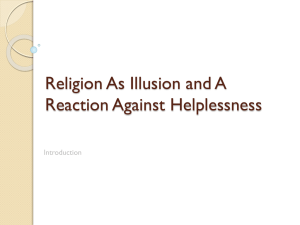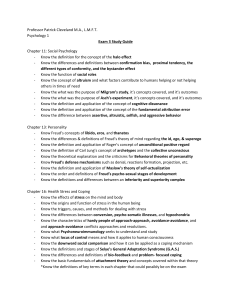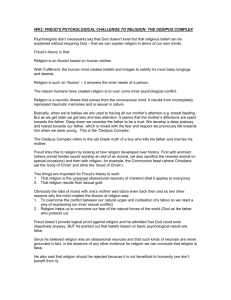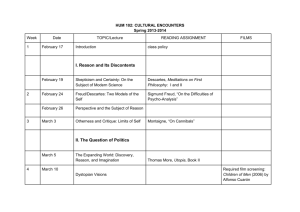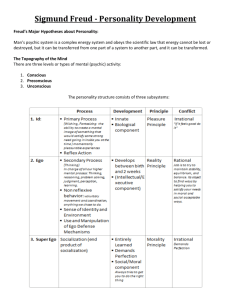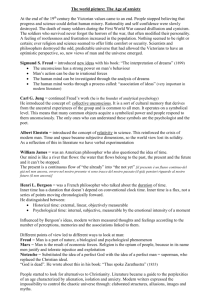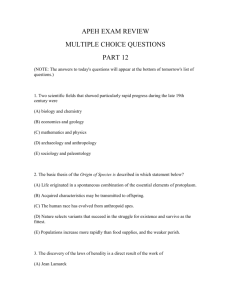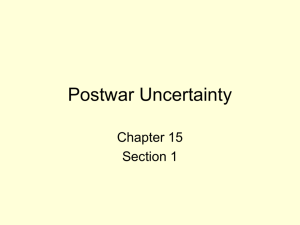Freud and James on Religious Experience
advertisement
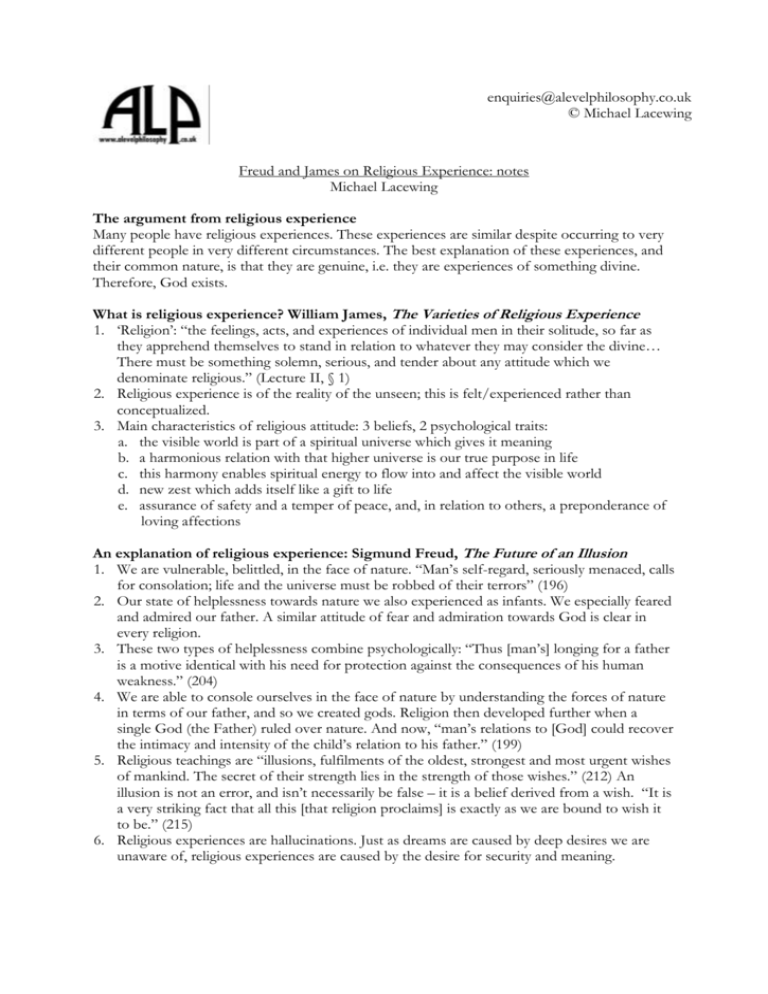
enquiries@alevelphilosophy.co.uk © Michael Lacewing Freud and James on Religious Experience: notes Michael Lacewing The argument from religious experience Many people have religious experiences. These experiences are similar despite occurring to very different people in very different circumstances. The best explanation of these experiences, and their common nature, is that they are genuine, i.e. they are experiences of something divine. Therefore, God exists. What is religious experience? William James, The Varieties of Religious Experience 1. ‘Religion’: “the feelings, acts, and experiences of individual men in their solitude, so far as they apprehend themselves to stand in relation to whatever they may consider the divine… There must be something solemn, serious, and tender about any attitude which we denominate religious.” (Lecture II, § 1) 2. Religious experience is of the reality of the unseen; this is felt/experienced rather than conceptualized. 3. Main characteristics of religious attitude: 3 beliefs, 2 psychological traits: a. the visible world is part of a spiritual universe which gives it meaning b. a harmonious relation with that higher universe is our true purpose in life c. this harmony enables spiritual energy to flow into and affect the visible world d. new zest which adds itself like a gift to life e. assurance of safety and a temper of peace, and, in relation to others, a preponderance of loving affections An explanation of religious experience: Sigmund Freud, The Future of an Illusion 1. We are vulnerable, belittled, in the face of nature. “Man’s self-regard, seriously menaced, calls for consolation; life and the universe must be robbed of their terrors” (196) 2. Our state of helplessness towards nature we also experienced as infants. We especially feared and admired our father. A similar attitude of fear and admiration towards God is clear in every religion. 3. These two types of helplessness combine psychologically: “Thus [man’s] longing for a father is a motive identical with his need for protection against the consequences of his human weakness.” (204) 4. We are able to console ourselves in the face of nature by understanding the forces of nature in terms of our father, and so we created gods. Religion then developed further when a single God (the Father) ruled over nature. And now, “man’s relations to [God] could recover the intimacy and intensity of the child’s relation to his father.” (199) 5. Religious teachings are “illusions, fulfilments of the oldest, strongest and most urgent wishes of mankind. The secret of their strength lies in the strength of those wishes.” (212) An illusion is not an error, and isn’t necessarily be false – it is a belief derived from a wish. “It is a very striking fact that all this [that religion proclaims] is exactly as we are bound to wish it to be.” (215) 6. Religious experiences are hallucinations. Just as dreams are caused by deep desires we are unaware of, religious experiences are caused by the desire for security and meaning. A response: William James 1. Religious experiences are subjectively convincing, more so than arguments of reason, because the premises with which reason works have been prepared by “your whole subconscious life”. (Lecture III, § 2) 2. What is personal and subjective is not necessarily ‘unreal’. In fact, every experience must have a personal and subjective element. Experiences of meaning obviously will. 3. All religion points to the feeling that there is something wrong with us as we stand, and that this is corrected by becoming in touch with higher power. Awareness of this leads to awareness of being in touch with something MORE. 4. “Whatever it may be on its farther side, the 'more' with which in religious experience we feel ourselves connected is on its hither side the subconscious continuation of our conscious life…” (Lecture XX, § 6) Beyond this we step into ‘over-belief’. Discussion 1. James’ argument from religious belief does not yet establish the existence of God. But he adds at the end: “God is real since he produces real effects.” (Lecture XX, § 7) 2. This still doesn’t tell us what God’s nature is. However, we might argue that we can infer this from the two psychological characteristics of the religious life – a zest for life and a predominance of loving relationships. 3. Freud: real effects can be produced by psychological causes. 4. Freud: “Of the reality value of [religious experiences] we cannot judge; just as they cannot be proved, so they cannot be refuted… The riddles of the universe reveal themselves only slowly to our investigation… But scientific work is the only road which can lead us to a knowledge of reality outside ourselves.” (213-4) Is it? Further reading Mel Thompson, Religion and Science, Ch. 4 Mel Thompson, Teach Yourself Philosophy of Religion, Ch. 1 Michael Peterson, et. al., Reason and Religious Belief, Ch. 2 William James, The Varieties of Religious Experience, Lectures I-III, XX Sigmund Freud, The Future of an Illusion (quotations: Penguin Freud Library edition, Vol. XII)
